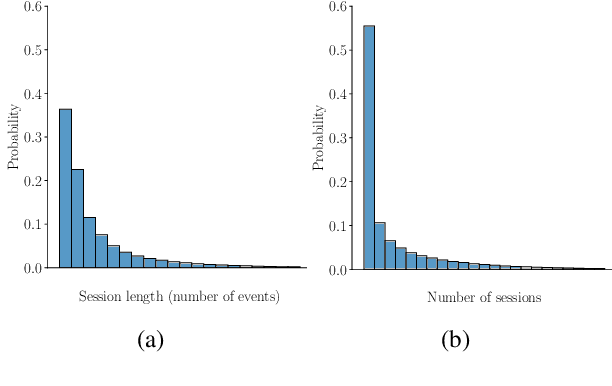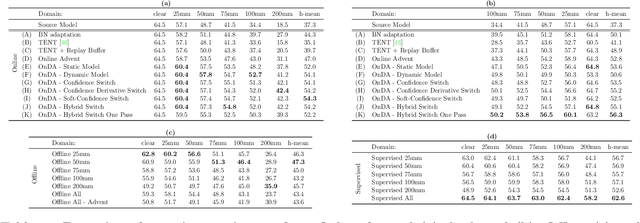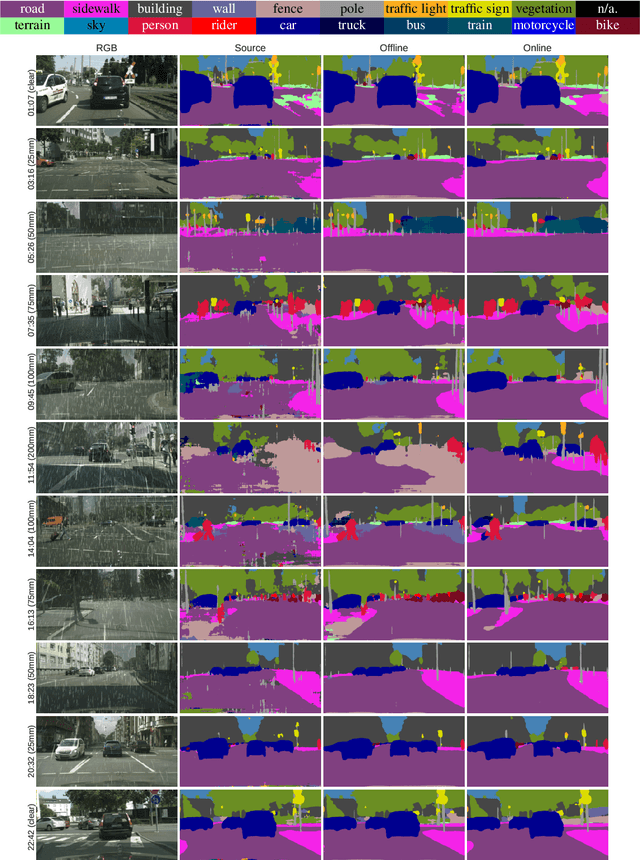Theodoros Panagiotakopoulos
Semantic Library Adaptation: LoRA Retrieval and Fusion for Open-Vocabulary Semantic Segmentation
Mar 27, 2025Abstract:Open-vocabulary semantic segmentation models associate vision and text to label pixels from an undefined set of classes using textual queries, providing versatile performance on novel datasets. However, large shifts between training and test domains degrade their performance, requiring fine-tuning for effective real-world applications. We introduce Semantic Library Adaptation (SemLA), a novel framework for training-free, test-time domain adaptation. SemLA leverages a library of LoRA-based adapters indexed with CLIP embeddings, dynamically merging the most relevant adapters based on proximity to the target domain in the embedding space. This approach constructs an ad-hoc model tailored to each specific input without additional training. Our method scales efficiently, enhances explainability by tracking adapter contributions, and inherently protects data privacy, making it ideal for sensitive applications. Comprehensive experiments on a 20-domain benchmark built over 10 standard datasets demonstrate SemLA's superior adaptability and performance across diverse settings, establishing a new standard in domain adaptation for open-vocabulary semantic segmentation.
Understanding Players as if They Are Talking to the Game in a Customized Language: A Pilot Study
Oct 24, 2024



Abstract:This pilot study explores the application of language models (LMs) to model game event sequences, treating them as a customized natural language. We investigate a popular mobile game, transforming raw event data into textual sequences and pretraining a Longformer model on this data. Our approach captures the rich and nuanced interactions within game sessions, effectively identifying meaningful player segments. The results demonstrate the potential of self-supervised LMs in enhancing game design and personalization without relying on ground-truth labels.
player2vec: A Language Modeling Approach to Understand Player Behavior in Games
Apr 08, 2024Abstract:Methods for learning latent user representations from historical behavior logs have gained traction for recommendation tasks in e-commerce, content streaming, and other settings. However, this area still remains relatively underexplored in video and mobile gaming contexts. In this work, we present a novel method for overcoming this limitation by extending a long-range Transformer model from the natural language processing domain to player behavior data. We discuss specifics of behavior tracking in games and propose preprocessing and tokenization approaches by viewing in-game events in an analogous way to words in sentences, thus enabling learning player representations in a self-supervised manner in the absence of ground-truth annotations. We experimentally demonstrate the efficacy of the proposed approach in fitting the distribution of behavior events by evaluating intrinsic language modeling metrics. Furthermore, we qualitatively analyze the emerging structure of the learned embedding space and show its value for generating insights into behavior patterns to inform downstream applications.
To Adapt or Not to Adapt? Real-Time Adaptation for Semantic Segmentation
Aug 07, 2023

Abstract:The goal of Online Domain Adaptation for semantic segmentation is to handle unforeseeable domain changes that occur during deployment, like sudden weather events. However, the high computational costs associated with brute-force adaptation make this paradigm unfeasible for real-world applications. In this paper we propose HAMLET, a Hardware-Aware Modular Least Expensive Training framework for real-time domain adaptation. Our approach includes a hardware-aware back-propagation orchestration agent (HAMT) and a dedicated domain-shift detector that enables active control over when and how the model is adapted (LT). Thanks to these advancements, our approach is capable of performing semantic segmentation while simultaneously adapting at more than 29FPS on a single consumer-grade GPU. Our framework's encouraging accuracy and speed trade-off is demonstrated on OnDA and SHIFT benchmarks through experimental results.
Online Domain Adaptation for Semantic Segmentation in Ever-Changing Conditions
Jul 21, 2022



Abstract:Unsupervised Domain Adaptation (UDA) aims at reducing the domain gap between training and testing data and is, in most cases, carried out in offline manner. However, domain changes may occur continuously and unpredictably during deployment (e.g. sudden weather changes). In such conditions, deep neural networks witness dramatic drops in accuracy and offline adaptation may not be enough to contrast it. In this paper, we tackle Online Domain Adaptation (OnDA) for semantic segmentation. We design a pipeline that is robust to continuous domain shifts, either gradual or sudden, and we evaluate it in the case of rainy and foggy scenarios. Our experiments show that our framework can effectively adapt to new domains during deployment, while not being affected by catastrophic forgetting of the previous domains.
 Add to Chrome
Add to Chrome Add to Firefox
Add to Firefox Add to Edge
Add to Edge